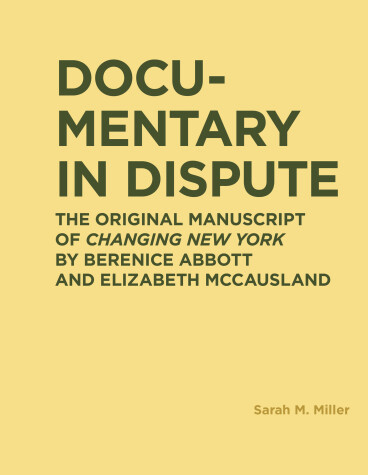RIC BOOKS (Ryerson Image Centre Books)
1 total work
The recreation of a landmark in 1930s documentary photography.
The 1939 book Changing New York by Berenice Abbott, with text by Elizabeth McCausland, is a landmark of American documentary photography and the career-defining publication by one of modernism's most prominent photographers. Yet no one has ever seen the book that Abbott and McCausland actually planned and wrote. In this book, art historian Sarah M. Miller recreates Abbott and McCausland's original manuscript for Changing New York by sequencing Abbott's one hundred photographs with McCausland's astonishing caption texts. This reconstruction is accompanied by a selection of archival documents that illuminate how the project was developed, and how the original publisher drastically altered it.
Miller analyzes the manuscript and its revisions to unearth Abbott and McCausland's critical engagement with New York City's built environment and their unique theory of documentary photography. The battle over Changing New York, she argues, stemmed from disputes over how Abbott's photographs—and photography more broadly—should shape urban experience on the eve of the futuristic 1939 World's Fair. Ultimately it became a contest over the definition of documentary itself. Gary Van Zante and Julia Van Haaften contribute an essay on Abbott's archive and the partnership with McCausland that shaped their creative collaboration.
Copublished with Ryerson Image Centre, Toronto
The 1939 book Changing New York by Berenice Abbott, with text by Elizabeth McCausland, is a landmark of American documentary photography and the career-defining publication by one of modernism's most prominent photographers. Yet no one has ever seen the book that Abbott and McCausland actually planned and wrote. In this book, art historian Sarah M. Miller recreates Abbott and McCausland's original manuscript for Changing New York by sequencing Abbott's one hundred photographs with McCausland's astonishing caption texts. This reconstruction is accompanied by a selection of archival documents that illuminate how the project was developed, and how the original publisher drastically altered it.
Miller analyzes the manuscript and its revisions to unearth Abbott and McCausland's critical engagement with New York City's built environment and their unique theory of documentary photography. The battle over Changing New York, she argues, stemmed from disputes over how Abbott's photographs—and photography more broadly—should shape urban experience on the eve of the futuristic 1939 World's Fair. Ultimately it became a contest over the definition of documentary itself. Gary Van Zante and Julia Van Haaften contribute an essay on Abbott's archive and the partnership with McCausland that shaped their creative collaboration.
Copublished with Ryerson Image Centre, Toronto
